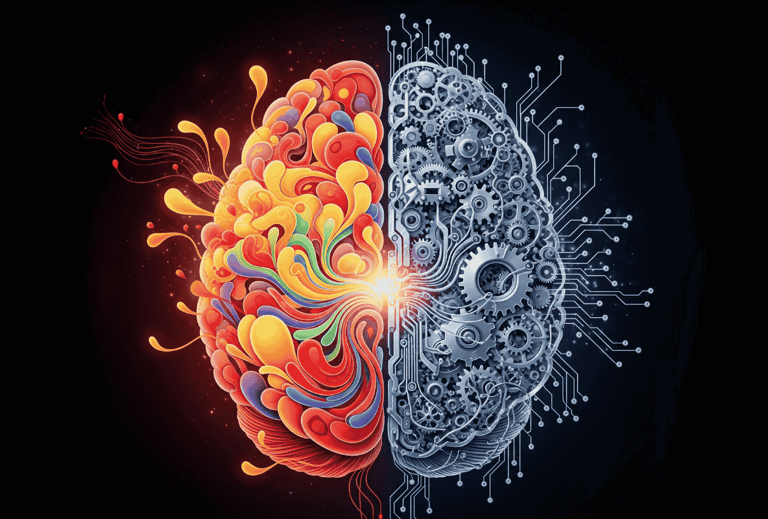Descartes' Error: How Emotions Drive Rational Decision-Making
For centuries, we separated reason from emotion. Learn how modern neuroscience debunked this myth and revealed the vital role of "gut feelings" in our choices.
Founder's Insights
8/4/20253 min read


We’ve all been told to "think with our head, not our heart." The ideal decision-maker, we're taught, is cool, logical, and rational, pushing aside messy emotions to arrive at the perfect choice. This idea has shaped everything from philosophy to modern economics.
But what if it's completely wrong?
What if emotion isn't the enemy of reason, but its essential partner? This is the revolutionary idea behind "Descartes' Error," a concept that flips centuries of thinking on its head, all thanks to a handful of bizarre medical cases.
Descartes' Big Idea: The Mind and Body Split
Let's travel back to the 17th century. René Descartes, a brilliant French philosopher and mathematician, introduced a groundbreaking idea: mind-body dualism. He argued that the mind (our thoughts, consciousness, and soul) was a non-physical substance, completely separate from the body (the physical machine it inhabits).
Your mind decides to pick up a cup, and your body does it. Your body touches a hot stove, and your mind feels pain. They interact, but they are fundamentally different.
This concept was hugely influential. It suggested that human behavior, driven by the logical mind, could be studied objectively, like a machine. This laid the groundwork for economic theories that assume people are rational actors, always making decisions based on logical cost-benefit analysis. The problem is, it’s not how our brains actually work.
A Hole in the Head, A Hole in the Theory
The first major clue that Descartes was wrong came from a familiar name: Phineas Gage. As we explored before, when a tamping iron shot through Gage’s frontal lobe, his intellect and memory remained intact, but his ability to make good decisions was destroyed. He was no longer Gage because his emotional regulation was gone.
This wasn't an isolated case. In the late 20th century, neuroscientist António Damásio began studying patients with similar damage to the emotion-processing parts of their prefrontal cortex. What he found would change neuroscience forever.
These patients were intelligent, logical, and could score high on IQ tests. Yet, their lives were falling apart.
They made disastrous financial decisions, losing their life savings.
They couldn't hold down jobs, despite having the necessary skills.
They chose terrible partners and alienated their friends and family.
Their logic was fine, so what was going wrong?
Damasio's Bombshell: The Somatic Marker Hypothesis
In his 1994 book, Descartes' Error: Emotion, Reason, and the Human Brain, Damasio proposed a stunning explanation. He argued that rational thought cannot be separated from emotions and bodily states.
He introduced the "somatic marker hypothesis." This suggests that our brain tags experiences with emotions or "gut feelings." When you consider a choice, your brain retrieves these emotional tags to quickly mark options as good or bad.
Thinking about a risky investment? You might feel a faint knot of anxiety in your stomach—a negative somatic marker.
Considering a job offer from a great company? You might feel a subtle warmth of excitement—a positive somatic marker.
These aren't distractions; they are crucial pieces of data. They are shortcuts that our brain uses to narrow down the options so our conscious mind can apply logic to the best few choices.
Damasio’s patients with frontal lobe damage had lost this ability. Their logical minds could list the pros and cons of a decision for hours, but without the emotional "gut feelings" to guide them, they were paralyzed. They couldn't feel which choice was better, so they often made catastrophic ones. Their emotional compass was broken.
We Are Feeling Machines That Think
The evidence is clear: Descartes' neat split between a rational mind and a physical body was a fundamental error. Emotions are not a flaw in our reasoning; they are a foundational part of it.
For millions of years, our brains have relied on these deeply embedded emotional instincts to survive. As Damasio famously put it:
“We are not thinking machines that feel; we are feeling machines that think.”
Our ability to reason is not a pure, logical process. It's a complex dance between logic, memory, and the emotional wisdom stored deep within our biology.
Have you ever made a big decision based on a "gut feeling"? I'd love to hear your story! Share your experience using the contact form.
Craft your brand story. Be seen.
Curafto Communications Pvt. Ltd.
Bengaluru, India
📩info@curafto.com
📞+91 636 462 0912
© 2025 Curafto Communications Pvt. Ltd. All rights reserved.
